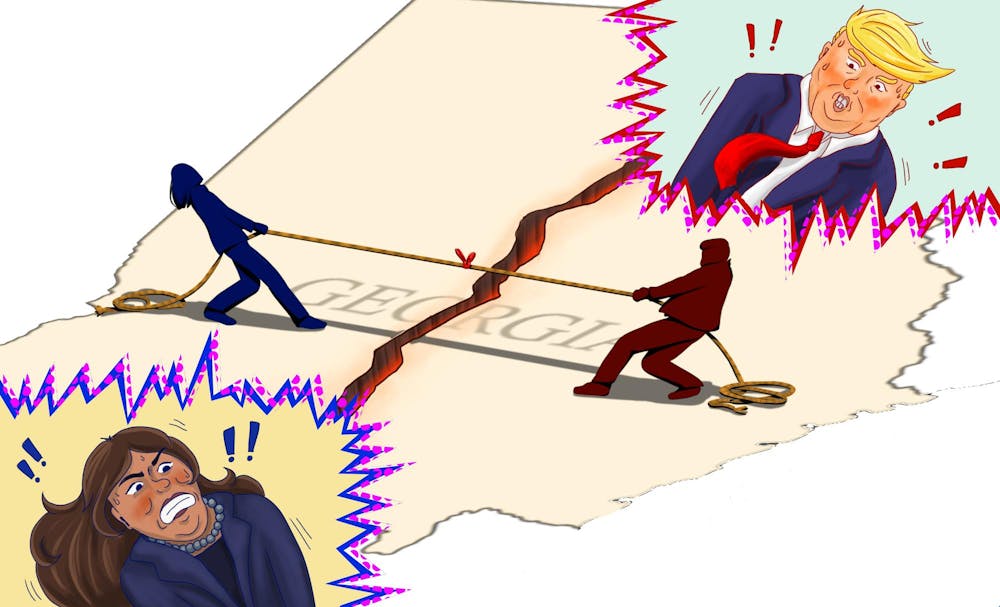Following a tense campaign season, President-elect Donald Trump now leads in Electoral College votes, projecting his win as the next president of the United States, as of print time. Trump won swing states North Carolina and Georgia early on the morning of Nov. 6, invoking Democrats’ worst anxieties about a second Trump administration. While it is grim to confront the daunting premise of Trump’s second ascent to power on Jan. 20, 2025, supporters of Vice President Kamala Harris’ campaign must redirect their civic engagement to protecting America’s most vulnerable communities — Black and Hispanic Americans, undocumented immigrants and queer people — to avoid the worst possibilities of Trump’s second shot at the presidency.
Trump’s predicted victory marks a frightening step backward from the progress of President Joe Biden’s administration and gives Trump’s xenophobic and hostile campaign the legitimacy and the platform of the executive branch. We cannot allow this vitriol to define us or the steps we will take as a nation in the wake of this reckoning. What we do know is that a second Trump term looms ahead, and we must fight against the impacts his policies will have on the United States’ most vulnerable populations.
Just last week, Trump made incendiary remarks about transgender rights at a campaign event, the latest of a slew of anti-LGBTQ+ rhetoric from his previous administration and current campaign. He has consistently maintained his intention to “define ‘transgender’ out of existence” by reversing Biden’s policy to protect transgender people under Title IX. Trump’s second term would enact his hateful rhetoric: With his intention to remove protections in diverse spaces like employment, housing, education and healthcare for LGBTQ+ communities, Trump has made it painfully clear that he has no qualms with squandering human rights.
Mainstream policy has long neglected rights for immigrant populations in the United States, especially during Trump’s first administration. Central pillars of Trump’s campaign and presidency were halting illegal border crossings and deporting undocumented immigrants. If the policies he has advocated for are implemented, millions of people will be threatened with deportation. Trump also expressed plans to call local police officers to carry out mass deportations for immigrants residing in the United States, and even suggested deploying the National Guard in a massive campaign against undocumented individuals. This is not just a political issue but a moral one, as the future of millions of families hangs in the balance. Their survival depends on the whims of politicians who seem to have forgotten that immigration is not just a political issue but also a human rights one. It is up to communities across the U.S., marginalized and not, to remember collective humanity and act upon it faithfully.
Do not overlook the more than 3.5 million people who live in U.S. territories, either — Puerto Rico, Guam, American Samoa, the U.S. Virgin Islands and the Northern Mariana Islands. Despite the fact that most residents are citizens and many have family in the continental United States and all pay federal taxes, those living in these territories lack representation in presidential elections. The limitations on Puerto Rican self-governance have only grown starker, with recent incidents reigniting residents’ frustrations about their disenfranchisement. At a Trump rally, comedian Tony Hinchcliffe’s derogatory remarks describing Puerto Rico as a “floating island of garbage” stirred anger across the island as well as within Puerto Rican populations in the continental United States. This disdain for Hinchcliffe’s comments echoes long-held resentment over Puerto Ricans’ treatment as second-class citizens in a nation that touts equality.
Furthermore, throughout the election, the Israeli military campaign in the Gaza Strip was a contentious topic for both candidates. Trump’s pledges to end the war in the Middle East “no matter what” are equally as chilling as Biden’s complacency. The Israel-Hamas war has been particularly divisive in swing states like Michigan, especially in the cities of Dearborn and Detroit, where there are large Arab-American communities. Many Arab-Americans and Muslims have pushed for Harris to strongly condemn Israel’s actions in the Gaza Strip and to cease providing military support, but Harris’ intentions to maintain friendly relations with Israel did not waver. While it may be tempting to prefer Trump’s promises to end the conflict, we must not disregard his reputation for xenophobia and foreign policy isolationism.
“Movements are hardly ever substantiated by politicians — they are put into effect by people,” The Emory Wheel’s Editorial Board wrote in response to former State Rep. Stacey Abrams’ (D-84) loss to Gov. Brian Kemp (R-Ga.) in 2022. Today, as we face a potential second Trump presidency and a majority-red Georgia, we echo this sentiment. No Biden, Harris or Trump administration will or can do what our communities can: Advocate for and uplift populations that are consistently marginalized. Although this obstacle may slow down our momentum, do not let it halt us.
The occupation of political offices may be temporary, but your civic engagement is not — it must become the impetus of our present moment. Despite his implications about suppression of speech, Trump cannot stifle your voice from his seat in the White House. The only way to protect it is to keep using it. Communities like Palestinian Americans, Puerto Ricans, LGBTQ+ people and many more populations may experience the same disregard and policy outcomes under both Harris and Trump — and that can only be palliated by centering these groups and their collective struggle in our community building. We cannot let frustration consume us as we enter this new era in politics.
The above editorial represents the majority opinion of The Emory Wheel’s Editorial Board. The Editorial Board is composed of Editor Marc Goedemans, Carly Aikens, Hunter Buchheit, Allie Guo, Ethan Jacobs, Carson Kindred, Justin Leach, Eliana Liporace, Niki Rajani, Josh Rosenblut, Ilka Tona and Crystal Zhang.










